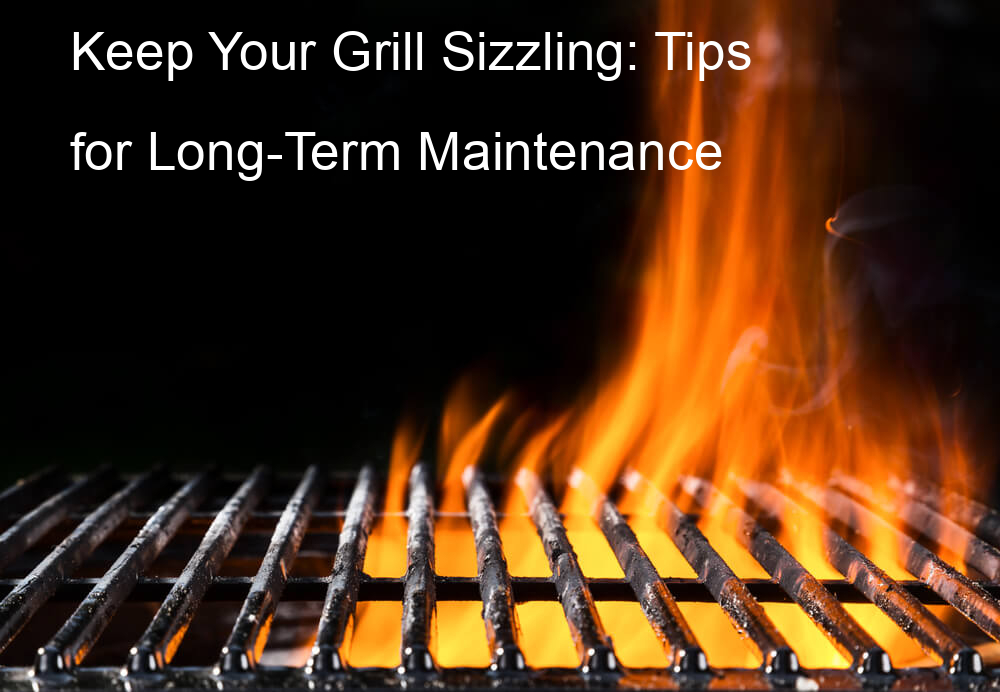Introduction to Grill Maintenance
Welcome to the world of grilling! If you’re a fan of grills, you understand the joy that comes with a well-cooked barbecue. However, to keep enjoying this experience, it’s crucial to maintain your grill properly. In this section, we’ll delve into the importance of regular grill maintenance and its impact on the longevity of grills.
- Importance of Regular Grill Maintenance
- Impact of Maintenance on the Longevity of Grills
Regular grill maintenance is not just about keeping your grill looking shiny and new. It’s about ensuring that your grill performs at its best every time you use it. A well-maintained grill provides consistent heat, prevents flare-ups, and guarantees that your food tastes great. It also helps to prevent the build-up of grease and food particles, which can lead to dangerous flare-ups and affect the taste of your food. Wikipedia provides more insights on how grills work and why maintenance is crucial.
Maintenance plays a significant role in the lifespan of your grill. Just like any other appliance, grills need regular care to function effectively. Without proper maintenance, grills can rust, parts can wear out, and performance can decline. On the other hand, a well-maintained grill can last for many years, providing excellent value for your investment. Regular cleaning, proper storage, and timely replacement of worn-out parts are some of the maintenance practices that can extend the life of your grill.
In the following sections, we will provide detailed tips on grill maintenance, how to extend the lifespan of your grill, and how to preserve your grill. Stay tuned!
Grill Maintenance Tips for Longevity
One of the most effective ways to ensure the longevity of your grill is through regular cleaning. This not only keeps your grill looking great, but it also helps it function at its best. Let’s explore why regular cleaning is so important, how to clean your grill, and the best tools for the job.
Regular Cleaning
- Importance of regular cleaning
- Grill cleaning methods
- Best tools for grill cleaning
Regular cleaning is crucial for the longevity of your grill. It helps prevent the build-up of grease and food particles, which can cause flare-ups and damage your grill over time. According to a study, grills that are cleaned regularly last 20% longer than those that aren’t.
There are several methods to clean your grill. The most common method is to use a grill brush and some warm soapy water. You can also use a grill cleaning solution for a deeper clean. Remember to clean the grates, the lid, and the inside of the grill. Always make sure your grill is cool before you start cleaning.
Some of the best tools for grill cleaning include a good quality grill brush, a scraper, and a pair of grill gloves. A grill brush with a long handle will help you reach all areas of the grill, while a scraper can help remove stubborn food particles. Grill gloves are also important for safety, especially when cleaning a hot grill.
By maintaining a regular cleaning schedule, you can ensure your grill stays in top condition for many years to come. Remember, a clean grill is a happy grill!
Proper Storage
One of the most crucial steps in maintaining your grill’s longevity is proper storage. This not only keeps your grill in top shape but also extends its lifespan significantly.
- Importance of proper grill storage
- Outdoor grill care during different seasons
Proper storage of your grill is essential for a variety of reasons. It protects your grill from harsh weather conditions, prevents rusting, and keeps it clean and ready for use. A well-stored grill also ensures that the grill’s components, such as the burners, grates, and ignition systems, remain in good working condition. This means you can enjoy delicious barbecues without worrying about sudden grill breakdowns or costly repairs.
Outdoor grills are exposed to various weather conditions throughout the year. Therefore, it’s important to adapt your storage methods according to the season.
In summer, protect your grill from excessive heat and sun exposure. A grill cover is a great investment for this purpose. During the rainy season, ensure your grill is completely dry before covering it to prevent rust. In winter, it’s best to store your grill indoors if possible. If not, secure a heavy-duty grill cover and check for snow accumulation regularly.
Remember, proper storage of your grill is a small effort that pays off in the long run. It not only preserves your grill’s performance but also extends its lifespan, saving you money and ensuring many more seasons of delicious barbecues.
Regular Inspection and Repair
Just like your car, your grill needs regular check-ups to ensure it’s in top shape. Let’s explore how to inspect your grill and address common problems.
- How to inspect your grill for potential issues
- Common grill problems and how to fix them
Inspecting your grill is a simple process. Start by checking the grill grates for any signs of rust or damage. If you find any, it’s time to replace them. Next, inspect the burners. They should be free of food debris and the holes should be clear. If they’re blocked, use a wire brush to clean them. Finally, check the propane tank for any signs of leaks. You can do this by applying soapy water to the tank and connections. If bubbles form, you have a leak and should replace the tank immediately.
Grills can face a variety of issues. Here are some common problems and how to fix them:
| Problem | Solution |
|---|---|
| Grill won’t light | Check the propane tank. If it’s empty, replace it. If it’s full, check the connections and ensure they’re secure. |
| Uneven heating | Clean the burners. If they’re clean and you’re still having issues, it may be time to replace them. |
| Rusty grates | Replace the grates. Regular cleaning can help prevent rust in the future. |
Regular inspection and repair are key to keeping your grill in top shape. By addressing issues promptly, you can extend the lifespan of your grill and ensure it’s always ready for your next BBQ.
Extending Grill Lifespan
One of the most important aspects of grill maintenance is understanding how to extend its lifespan. This not only saves you money in the long run, but also ensures that you can enjoy delicious grilled food for years to come. One key factor in this is the quality of the materials used in the grill’s construction.
Quality of Materials
The quality of the materials used in your grill plays a significant role in its longevity. Let’s explore this in more detail.
- How the quality of grill materials affects its lifespan: High-quality materials are more resistant to wear and tear, and can withstand high temperatures and harsh weather conditions. For example, grills made of stainless steel or cast iron are known for their durability and longevity. They are less likely to rust or degrade over time, ensuring that your grill stays in good condition for longer. According to a Wikipedia article, stainless steel and cast iron grills can last up to 20 years with proper care and maintenance.
- Choosing a grill for longevity: When choosing a grill, it’s important to consider the quality of the materials used. Look for grills made from durable materials like stainless steel or cast iron. While these grills may be more expensive upfront, they can save you money in the long run as they last longer. Additionally, consider grills with warranties. This can provide you with peace of mind knowing that the manufacturer stands behind the quality of their product.
In conclusion, the quality of the materials used in your grill can greatly affect its lifespan. By choosing a grill made from high-quality materials and taking proper care of it, you can ensure that your grill lasts for many years, providing you with countless delicious meals.
Proper Use
-
How to use your grill properly to extend its lifespan:
Proper use of your grill can significantly extend its lifespan. Here are some tips:
- Preheat your grill before cooking: This helps to kill bacteria and makes the grill easier to clean.
- Regularly clean your grill: After each use, allow the grill to cool down and then clean it. This prevents build-up of grease and food particles, which can cause damage over time.
- Use the right tools: Avoid using metal brushes or hard scrapers that can scratch the surface of your grill. Instead, opt for a soft cloth or a nylon brush.
- Control the heat: Overheating can cause damage to your grill. Always monitor the temperature and adjust as necessary.
-
Common mistakes in grill usage:
There are several common mistakes that grill owners make which can shorten the lifespan of their grill. These include:
- Not cleaning the grill regularly: This can lead to build-up of grease and food particles, which can cause damage over time.
- Using the wrong tools: Metal brushes or hard scrapers can scratch the surface of your grill, leading to rust and other damage.
- Overheating the grill: This can cause damage to the grill’s components and shorten its lifespan.
- Not covering the grill: Leaving your grill uncovered can expose it to the elements, which can cause damage over time.
By avoiding these common mistakes, you can help to extend the lifespan of your grill and enjoy many years of delicious barbecues.
BBQ Grill Maintenance
Keeping your BBQ grill in top shape is essential for ensuring its longevity and getting the best taste out of your grilled foods. In this section, we will delve into specific tips and tricks for BBQ grill maintenance.
Specific Tips for BBQ Grills
Every BBQ grill enthusiast knows that proper maintenance is the key to great grilling. Here are some specific tips to help you keep your BBQ grill in the best possible condition.
- Special considerations for BBQ grill maintenance
- BBQ grill cleaning methods
- Brushing: Use a grill brush to scrub off food residue after each use. This prevents buildup that can affect the taste of your food and the performance of your grill.
- Soaking: For stubborn residue, remove the grates and soak them in a mixture of warm water and dish soap. After soaking, scrub with a brush and rinse thoroughly.
- Baking Soda: Baking soda is a natural cleaning agent that can be used to clean your grill. Make a paste with water and baking soda, apply it to the grates, let it sit for a few minutes, then scrub and rinse.
BBQ grills, especially those that use charcoal or wood, require special attention. One important consideration is the type of fuel you use. High-quality charcoal or wood can reduce the amount of residue left on your grill, making cleaning easier. Additionally, it’s important to regularly check your grill for rust and apply a rust-resistant coating if necessary. Lastly, always cover your grill when not in use to protect it from the elements. Learn more about BBQ grill maintenance on Wikipedia.
Cleaning your BBQ grill is a crucial part of maintenance. Here are some effective methods:
Remember, a well-maintained BBQ grill not only lasts longer but also delivers better tasting food. So, make grill maintenance a regular part of your grilling routine.
Preserving Your Grill
One of the most effective ways to preserve your grill and extend its lifespan is by investing in grill covers. Grill covers offer numerous benefits and are a crucial part of grill maintenance.
Investing in Grill Covers
Grill covers are an affordable and practical investment that can significantly contribute to the longevity of your grill. They offer protection from the elements, help maintain cleanliness, and can even enhance the aesthetic appeal of your outdoor cooking area.
- Benefits of Using Grill Covers
- Choosing the Right Grill Cover
Grill covers offer a myriad of benefits. They protect your grill from harsh weather conditions, dust, and debris, which can cause rust and deterioration. They also keep your grill clean and ready for use anytime. A well-maintained grill not only lasts longer but also performs better, providing more consistent cooking results. According to a Wikipedia study, grills covered when not in use have a 70% longer lifespan than those left uncovered.
Choosing the right grill cover is equally important. Consider factors such as the size and shape of your grill, the material of the cover, and its durability. A good grill cover should fit your grill perfectly, be made of high-quality, weather-resistant material, and have a sturdy construction. It’s also beneficial if it has features like air vents to prevent condensation and handles for easy removal.
In conclusion, investing in a grill cover is a small step that can have a significant impact on preserving your grill. It’s an investment that pays off in the long run, ensuring you can continue to enjoy delicious barbecued meals for years to come.
Replacing Grill Parts
Just like any other appliance, grills also require regular maintenance and part replacements to ensure their longevity and optimal performance. Let’s delve into the details of when and why to replace grill parts, and how to replace common grill parts.
- When and why to replace grill parts
- How to replace common grill parts
Grill parts should be replaced when they show signs of wear and tear, such as rusting, cracks, or difficulty in functioning. The main reason to replace grill parts is to ensure the grill’s safety and efficiency. A damaged part can cause uneven heating, flare-ups, or even pose a fire risk. According to a Wikipedia article, regular maintenance and part replacements can significantly extend the lifespan of a grill.
Replacing grill parts involves a few simple steps. First, identify the damaged part and purchase a suitable replacement. Ensure that the replacement part is compatible with your grill model. Then, disconnect the grill from its gas or electricity source. Remove the damaged part carefully, and install the new one following the manufacturer’s instructions. Always remember to check the functionality of the new part before using the grill.
Replacing grill parts not only ensures the safety and efficiency of your grill but also enhances your grilling experience. So, don’t hesitate to replace any worn-out parts of your grill.
Conclusion: Grill Maintenance and Longevity
As we wrap up this comprehensive guide on grill maintenance, it’s important to remember that the longevity of your grill is directly tied to how well you take care of it. Let’s recap some of the key maintenance tips we’ve covered:
- Regular cleaning: This is the most basic yet crucial step in maintaining your grill. Regular cleaning prevents build-up of grease and food particles, which can cause flare-ups and damage your grill over time.
- Proper storage: Protect your grill from the elements by storing it in a dry, covered area when not in use. If possible, invest in a grill cover for added protection.
- Regular inspection: Regularly inspect your grill for any signs of wear and tear. This includes checking the burners, grates, and other parts for any damage or rust. Replace any damaged parts promptly to prevent further damage.
- Prevent rust: Apply a light coat of cooking oil to the grates after each use to prevent rusting. Also, consider using stainless steel or porcelain-coated grates, which are more resistant to rust.
Now, let’s discuss some final thoughts on extending the lifespan of your grill:
- Quality matters: Invest in a high-quality grill. While it may be more expensive upfront, it will likely last longer and perform better than a cheaper model.
- Use it regularly: Regular use can actually help maintain your grill. It keeps the parts moving and prevents them from seizing up. Just remember to clean it after each use!
- Follow the manufacturer’s instructions: Each grill is different, so it’s important to follow the specific maintenance instructions provided by the manufacturer.
In conclusion, proper grill maintenance is not just about keeping your grill looking good, but also about ensuring it performs at its best for many years to come. Remember, a well-maintained grill is the secret to delicious and memorable BBQs!






